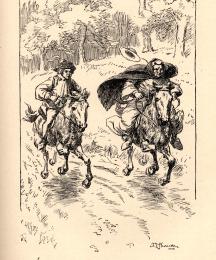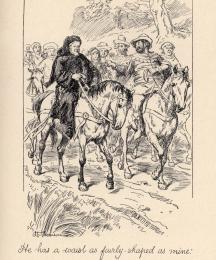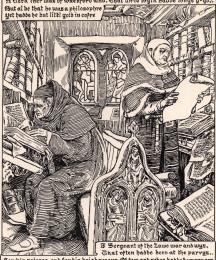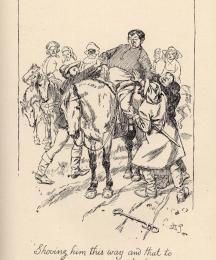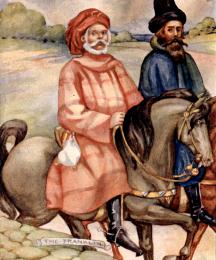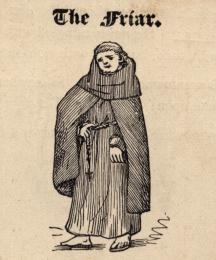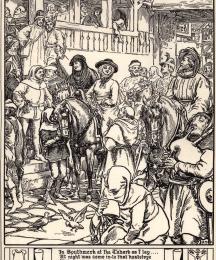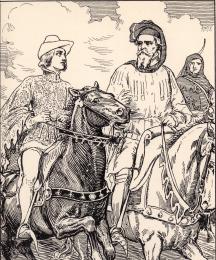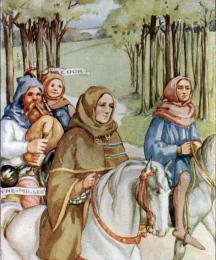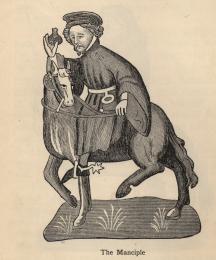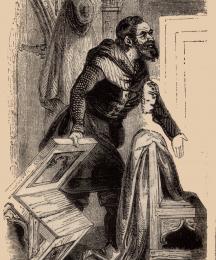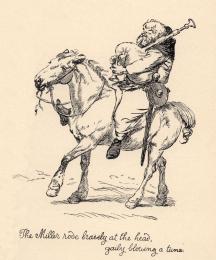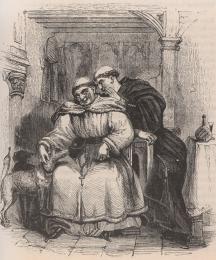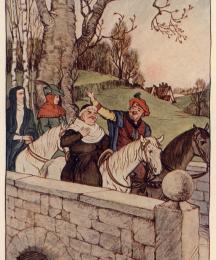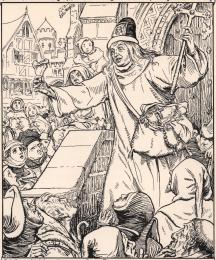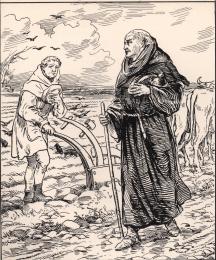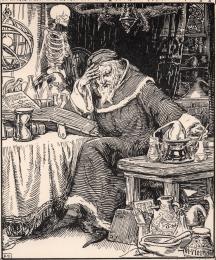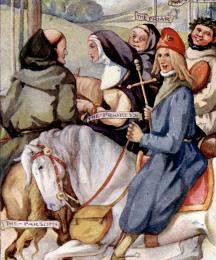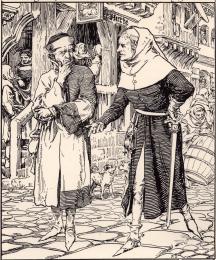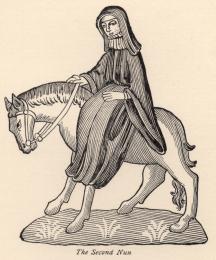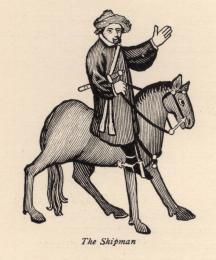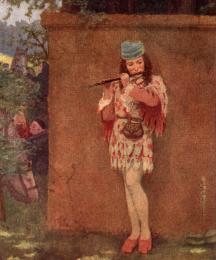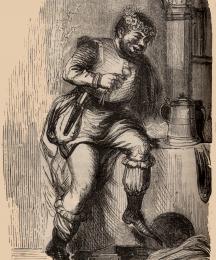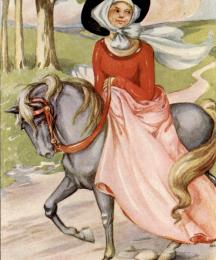The Canon's Yeoman is one of two travelers who meets up with the company at Boughton under Blean, about five miles from Canterbury; his tale begins with a technical alchemical description and then describes how a canon swindles a priest through false alchemy.
"Til that oure Hooste japen tho bigan,
And thanne at erst he looked upon me,
And seyde thus: 'What man artow?' quod he;
'Thou lookest as thou woldest fynde an hare,
For evere upon the ground I se thee stare.
Approche neer, and looke up murily.
Now war yow, sires, and lat this man have place!'"
The Chaucer pilgrim starts...
"A clerk ther was of Oxenford also,
That unto logyk hadde long ago.
As leene was his hors as is a rake,
And he nas nat right fat, I undertake,
But looked holwe, and therto sobrely.
Ful thredbare was his overeste courtepy,
For he hadde geten hym yet no benefice,
Ne was so worldly for to have office.
For hym was levere have at his beddes heed...
"A Cook they hadde with hem for the nones
To boille the chiknes with the marybones,
And poudre-marchant tart and galyngale.
Well koude he knowe a draughte of Londoun ale.
He koude rooste, and sethe, and broille, and frye,
Maken mortreux, and wel bake a pye." (ll. 379-384)
The Cook's Tale is a fragment. However, the Tale of...
"A Frankeleyn was in his compaignye.
Whit was his berd as is the dayesye;
Of his complexioun he was sangwyn.
Wel loved he by the morwe a sop in wyn;
To lyven in delit was evere his wone,
For he was Epicurus owene sone,
That heeld opinioun that pleyn delit
Was verray felicitee parfit.
An housholdere, and that a greet, was he;
Seing Julian he...
"A Frere ther was, a wantowne and a merye,
A lymytour, a ful solempne man.
In alle the ordres foure is noon that kan
So muchel of daliaunce and fair langage.
He hadde maad ful many a mariage
Of yonge wommen at his owene cost.
Unto his ordre he was a noble post." (208-214)
The Friar's Tale recounts the story of a dishonest summoner...
"A knyght ther was, and that a worthy man,
That fro the tyme that he first bigan
To riden out, he loved chivalrie,
Trouthe and honour, fredom and curteisie.
Ful worthy was he in his lordes werre,
And therto hadde he riden, no man ferre,
As wel in cristendom as in hethenesse,
And evere honoured for his worthynesse." (43-50)
The Knight...
"A Sergeant of the Lawe, war and wys,
That often hadde been at the Parvys,
Ther was also, ful riche of excellence.
Discreet he was and of greet reverence -
He semed swich, his wordes weren so wise.
Justice he was ful often in assise,
By patente and by pleyn commissioun." (309-315)
The Man of Law tells the story of Constance, a virtuous...
"A gentil Maunciple was ther of a temple,
Of which achatours myghte take exemple
For to be wise in byynge of vitaille;
For wheither that he payde of took by taille,
Algate he wayted so in his achaat
That he was ay biforn and in good staat.
Now is nat that of God a ful fair grace
That swich a lewed mannes wit shal pace
The wisdom of an heep of...
"A Marchant was ther with a forked berd,
In mottelee, and hye on horse he sat;
Upon his heed a Flaundryssh bever hat,
His bootes clasped faire and fetisly.
His resons he spak ful solempnely,
Sownynge alwey th'encrees of his wynnyng.
He wolde the see were kept for any thyng
Bitwixe Middelburgh and Orewelle."
Wel koude he in eschaunge...
"The Millere was a stout carl for the nones;
Ful byg he was of brawn, and eek of bones.
That proved wel, for over al ther he cam,
At wrastlynge he wolde have alwey the ram.
He was short-sholdred, brood, a thikke knarre;
Ther was no dore that he nolde heve of harre,
Or breke it at a rennyng with his heed.
His berd as any sowe or fox was reed,...
"A Monk ther was, a fair for the maistrie,
An outridere, that lovede venerie,
A manly man, to been an abbot able.
Ful many a deyntee horse hadde he in stable,
And whan he rood, men myghte his brydel heere
Gynglen in a whistlynge wynd als cleere
And eek as loude as dooth the chapel belle
Ther as this lorde was kepere of the celle.
The reule of...
"Another Nonne with hire hadde she,
That was hir chapeleyne, and preestes thre." (163-164).
The Nun's Priest's Tale is one of the most commonly retold tales from the Canterbury Tales as a whole. This animal fable describes the adventures of Chanticleer, a proud rooster, who has a very dramatic nightmare foretelling his own...
"With hym ther rood a gentil Pardoner
Of Rouncivale, his freend and his compeer,
That streight was comen fro the court of Rome.
Ful loude he soong 'Com hider, love, to me!'
...................................
This Pardoner hadde heer as yelow as wex,
But smothe it heeng as dooth a strike of flex;
By ounces henge his lokkes that he...
"A good man was ther of religioun,
And was a povre Persoun of a Toun,
But riche he was of hooly thoght and werk.
He was also a lerned man, a clerk,
That Cristes gospel trewely wolde preche;
........................................
This noble ensample to his sheep he yaf,
That first he wroughte, and afterward he taughte.
Out of the gospel he...
"With us ther was a Doctour of Phisik;
In al this world ne was ther noon hym lik,
To speke of phisik and of surgerye,
For he was grounded in astronomye.
He kepte his pacient a ful greet deel
In houres by his magyk natureel.
Wel koude he fortunen the ascendent
Of his ymages for his pacient.
He knew the cause of everich maladye,
Were it of hoot...
"Ther was also a Nonne, a Prioresse,
That of hir smylyng was ful symple and coy;
Hire gretteste ooth was but by Seinte Loy;
And she was cleped madame Eglentyne.
Ful weel she soong the service dyvyne,
Entuned in hir nose ful semely;
And Frenssh she spak ful faire and fetisly,
After the scole of Stratford atte Bowe,
For Frenssh of Pays was to...
"The Reve was a sclendre colerik man.
His berd was shave as ny as ever he kan;
His heer was by his erys ful round yshorn;
His top was dokked lyk a preest biforn.
Ful longe were his legges and ful lene,
Ylyk a staf: ther was no calf ysene.
Wel koude he kepe a gerner and a bynne;
Ther was noon auditour koude on him wynne.
Wel wiste he by the...
"Another Nonne with hire hadde she,
That was hir chapeleyne, and preestes thre." (163-64)
The Second Nun tells the legend of Saint Cecilia, from her marriage, through her time of preaching and conversion, to her eventual martyrdom.
"A Shipman was ther, wonynge fer by weste;
For aught I woot, he was of Dertemouthe.
He rood upon a rouncy, as he kouthe,
In a gowne of faldyng to the knee.
A daggere hangynge on a laas hadde he
Aboute his nekke, under his arm adoun.
The hoote somer hadde maad his hewe al broun;
And certeinly he was a good felawe." (388-395)
The Shipman...
"With hym ther was his sone, a yong Squier,
A lovyere and a lusty bacheler,
With lokkes crulle as they were leyd in presse.
Of twenty yeer of age he was, I gesse.
Of his stature he was of evene length,
And wonderly delyvere, and of greet strengthe.
And he hadde been somtyme in chyvachie
In Flaundres, in Artoys, and Pycardie,
And born hym weel...
"A Somonour was ther with us in that place,
That hadde a fyr-reed cherubynnes face,
For saucefleem he was, with eyen narwe.
As hoot he was and lecherous as a sparwe,
With scalled browes blake and piled berd.
Of his visage children were aferd.
Ther nas quyk-silver, lytarge, ne brymstoon,
Boras, ceruce, ne oille of tartre noon,
Ne...
"A good Wif was ther of biside Bathe,
But she was somdel deef, and that was scathe.
Of clooth-makynge she hadde swich an haunt
She passed hem of Ypres and of Gaunt.
In al the parisshe wif ne was ther noon
That to the offrynge bifore hire sholde goon;
And if ther dide, certeyn so wrooth was she
That she was out of alle charitee.
Hir...



